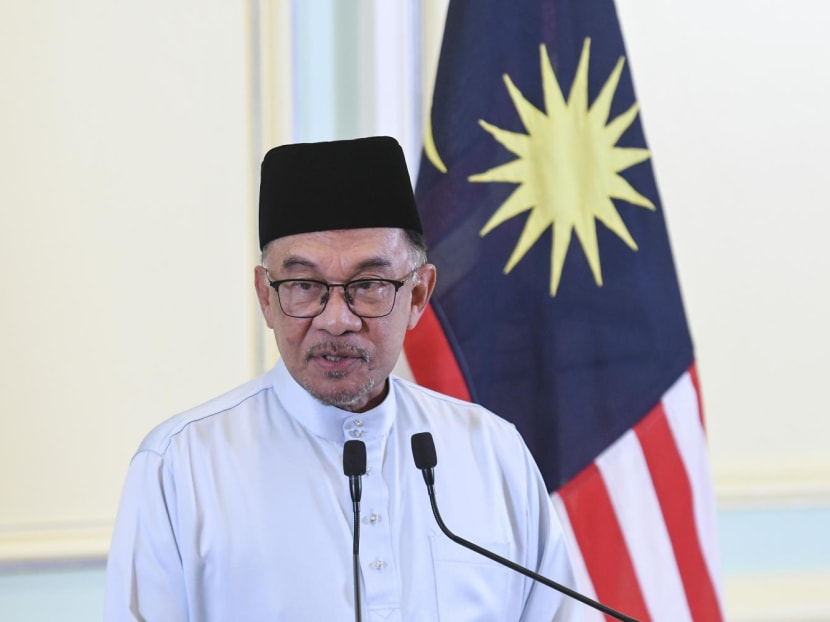Anwar’s confidence vote would set the bar for future Malaysian PMs: Analysts
KUALA LUMPUR — Mr Anwar Ibrahim is expected to secure a convincing majority in Monday's (Dec 19) vote of confidence as he bids to remove any lingering doubt around the legitimacy of his Malaysian prime ministership, analysts predicted.

Malaysia Prime Minister Anwar Ibrahim announces his new cabinet line-up at the Prime Minister Office in Putrajaya on Dec 2, 2022.
KUALA LUMPUR — Mr Anwar Ibrahim is expected to secure a convincing majority in Monday's (Dec 19) vote of confidence as he bids to remove any lingering doubt around the legitimacy of his Malaysian prime ministership, analysts predicted.
Mr Anwar is set to table a motion of confidence in the Dewan Rakyat today in a special proceeding that is scheduled to last until Tuesday (Dec 20), following up on a pledge to test his support in parliament made upon his appointment as Malaysian prime minister of a “unity government” forged with rivals amid controversy.
The announcement was lauded by governance watchdogs and political observers who said Mr Anwar was setting a crucial precedent to prevent future attempts to bypass the parliament in the event no clear winner emerges from a general election.
“This is a very positive move because the last two governments in 2020 and 2021 despite claiming to have a majority (support) they didn’t test it in parliament with a confidence vote, in fact the Speaker (at the time) blocked it,” said Prof James Chin, political analyst with the University of Tasmania.
“So, this is a very good chance for Mr Anwar to show that he has legitimacy and the support of parliament to be prime minister and govern and I’m hoping that all future governments would do the same even if it’s a ‘backdoor’ government,” he added.
A “backdoor government” was a pejorative that critics of the Perikatan Nasional (PN) administration coined after it replaced the first democratically-elected Pakatan Harapan (PH) government via a power grab in 2020, later dubbed as the “Sheraton Move”.
The PN leadership was then alleged to have installed a sympathetic dewan rakyat speaker to block any attempt to test Mr Muhyiddin Yassin’s support in parliament, an allegation Mr Azhar Idris Harun denied.
Mr Azhar, who had said he would step down, will have already vacated the Speaker seat by now and members of parliament (MP) are expected to vote for his replacement and two deputies by today or tomorrow.
Voting will not be done en bloc, according to Tanjung Malim MP and federal minister Chang Lih Kang, who said electing the Speaker and deputy Speakers will be among the sitting’s three main agendas.
The Anwar administration said it would only table a provisional Budget to cover emoluments of the civil service. A full federal spending plan is expected to be tabled in the first quarter of next year.
When asked if Mr Anwar and PH can expect a smooth vote, the PKR vice-president was confident the outcome would be positive.
“I think so. So far so good,” he told Malay Mail.
A vote of confidence for Mr Anwar, the MP for Tambun, could also signal the start of a stable term free of the political upheavals that beset the previous two administrations, which is crucial to restore confidence given the composition of Mr Anwar’s coalition government.
Despite holding 82 out of the 222 seats, a sudden pullout by any of the coalition partners could jeopardise Mr Anwar’s administration. Mr Anwar’s coalition government currently includes Barisan Nasional, Gabungan Parti Sarawak and Gabungan Rakyat Sabah. BN holds 30 seats while GPS and GRS have 22 and six seats, respectively.
“It’s important (for Mr Anwar to show he commands majority support) so that this government can move forward and do their job effectively,” said Dr Azmi Hasan, a political analyst.
“There would be no more lingering questions about Anwar’s legitimacy, especially from PN leaders.”
In 2021, Mr Muhyiddin was forced to resign after 11 BN lawmakers withdrew their support in a move engineered to place Umno in the driver's seat.
Mr Muhyiddin was replaced with Mr Ismail Sabri Yaakob, one of Umno’s three vice-presidents, but the party was still forced to share power with Mr Muhyiddin and members of the PN coalition because it had no majority backing.
As a result, the fragile Ismail government was forced to make concessions with the opposition to prevent another power tussle.
Dr Oh Ei Sun, a senior fellow at Singapore's Institute of International Affairs, said there is always a risk it could recur as mounting public suspicion and criticism of Mr Anwar’s cabinet line-up — whose members include Umno leaders facing multiple corruption charges — could force partners to abandon the coalition government.
Some analysts suggest the recent Padang Serai election result, which PH lost to PN despite being a three-term incumbent, was an early sign of potential disillusionment with Mr Anwar’s reform pledges.
“Obtaining a two-third majority is at best ephemeral under the current fluid Malaysian political situation,” Dr Oh said.
“It would probably prolong his government for a short period of time, hopefully weeks and not days. It may also be arguably attributed to his appointment of those corruption-tainted leaders, who roped in their parties’ MPs to support Mr Anwar,” Dr Oh added.
“So, if anything, it magnifies or keeps the controversy warm.” MALAY MAIL









